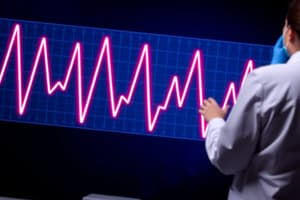Podcast
Questions and Answers
Which of the following is a precursor to vasovagal syncope?
Which of the following is a precursor to vasovagal syncope?
- Sinus tachycardia and ventricular fibrillation
- Atrial fibrillation and prolonged QTc interval
- Sinus bradycardia and asystole (correct)
- Ventricular tachycardia and cardiac syncope
What medications should be avoided in pre-excited AF?
What medications should be avoided in pre-excited AF?
- Diuretics and ACE inhibitors
- Beta blockers and calcium channel blockers
- Anticoagulants and antiplatelets
- Drugs that slow conduction through the AV node (correct)
What is the treatment for beta blocker and CCB overdose?
What is the treatment for beta blocker and CCB overdose?
- Atropine and temporary pacing
- Digoxin and verapamil
- Insulin and CCB
- Glucagon (correct)
What is the significance of age in atrial fibrillation?
What is the significance of age in atrial fibrillation?
What is the primary concern in patients with a history of MI and HFrEF?
What is the primary concern in patients with a history of MI and HFrEF?
What is the management of premature atrial beats/complexes?
What is the management of premature atrial beats/complexes?
What is the treatment for hyperkalemic emergency?
What is the treatment for hyperkalemic emergency?
What is the effect of hypokalemia on digoxin toxicity?
What is the effect of hypokalemia on digoxin toxicity?
What is the presentation of cor pulmonale?
What is the presentation of cor pulmonale?
What is the cause of cor pulmonale?
What is the cause of cor pulmonale?
What is the next step in managing hyperkalemia?
What is the next step in managing hyperkalemia?
What is the result of chronic hypoxia in cor pulmonale?
What is the result of chronic hypoxia in cor pulmonale?
Flashcards are hidden until you start studying
Study Notes
Vasovagal Syncope
- Preceded by sinus bradycardia and asystole
Arrhythmia and Cardiac Syncope
- Caused by sinus bradycardia, sinus pauses, AV block, and prolonged QTc interval
- Medications that slow conduction through the AV node (adenosine, digoxin, verapamil, beta blockers) are avoided in pre-excited AF
Treatment of Overdose
- Glucagon treats beta blocker and CCB overdose, and insulin overdose
- Glucagon is used after acute hemodynamic instability has been addressed with atropine or temporary pacing
Initial Presentation of Atrial Fibrillation
- May initially present with hyperthyroidism, COPD/OSA, and chronic hypertension
- Age is a strong contributor (paroxysmal palpitations in young is AVNRT/AVRT, but AF in old)
Evaluation of Arrhythmias
- Continuous ECG monitoring is needed for evaluation of arrhythmias (AF) and cardiac syncope if initial ECG is normal
Premature Atrial Beats
- Benign and occur when the atria are prematurely activated from a site other than the SA node
- Management is alcohol/tobacco/caffeine/stress abstinence and beta blockers
Ventricular Arrhythmias
- Most ventricular arrhythmias in acute MI occur within the first hour of symptoms
- Patients with history of MI and HFrEF (≤30%) are at increased risk of death due to ventricular arrhythmia (VTach, VFib, premature ventricular contractions)
- Management is beta-blocker, ACEi/ARB, spironolactone, and implantable cardioverter-debibrillator
Hyperkalemic Emergency
- Treated with calcium gluconate, insulin + glucose, albuterol, NaHCO3, patiromer (K+ stool binder), furosemide, and dialysis
- Urgent calcium gluconate, insulin, and glucose are reserved for ECG change, potassium ≥6.5 mEq/L, or rapidly rising potassium due to tissue breakdown
Digoxin Toxicity
- Causes atrial tachycardia with AV block resulting from increased automaticity of myocardial conduction and increased vagal tone
- Hypokalemia increases digoxin binding and worsens toxicity
ACS with Normal ECG
- Warrants serial ECGs every 15-30 minutes
Cor Pulmonale
- RV failure resulting from hypoxic vasoconstriction and pulmonary HTN (COPD, IPF, asbestosis, OSA, ARDS)
- Presents with SOB, pitting lower extremity edema, anorexia, abdominal pain, hepatomegaly, hepatojugular reflux, ascites, JVD, loud P2, S3, and TR in the absence of LV failure
- Management is echocardiogram and right heart catheterization
- May occur with chronic hypoxia, hypercapnia with compensatory metabolic alkalosis, and secondary erythrocytosis
Studying That Suits You
Use AI to generate personalized quizzes and flashcards to suit your learning preferences.




